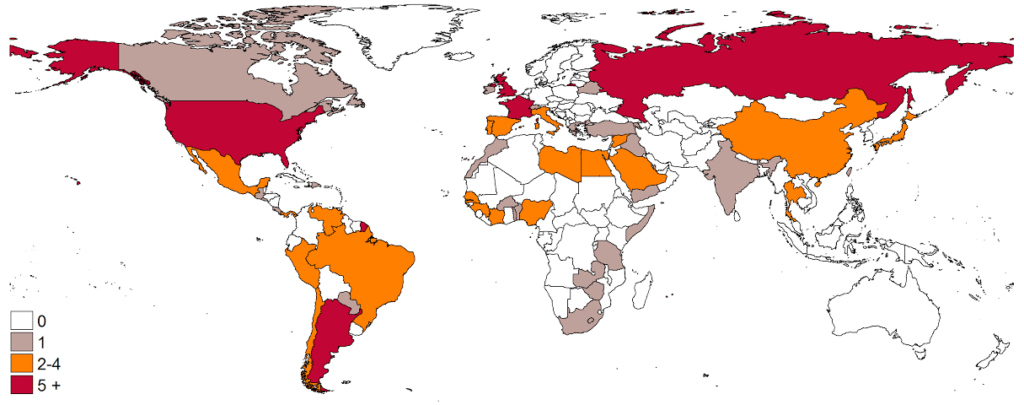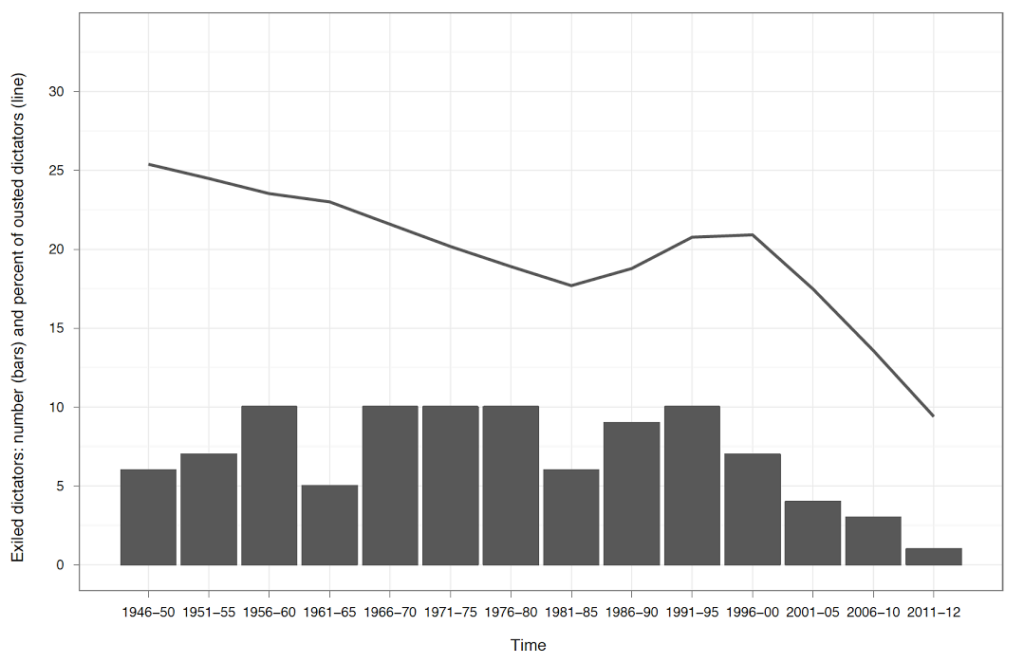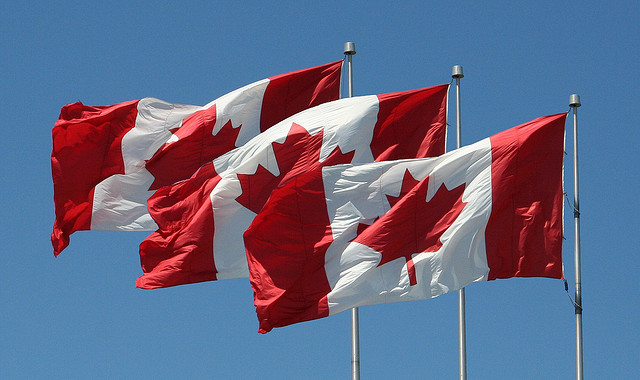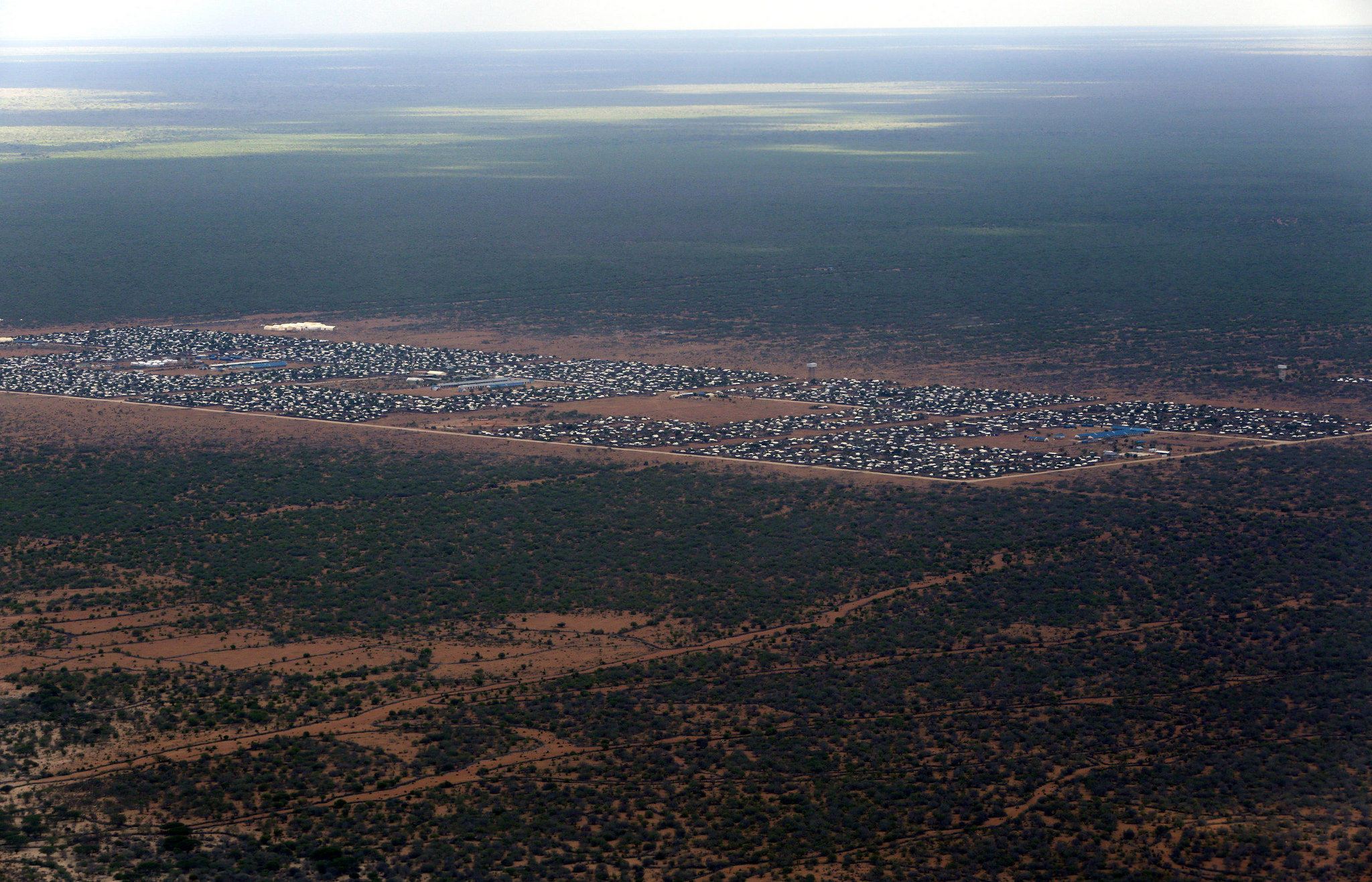By Daniel Krcmaric and Abel Escribà-Folch.
A dramatic scene unfolded in Gambia on Saturday night, January 21. Longtime leader Yahya Jammeh climbed aboard a small plane in the capital city of Banjul, waved a final goodbye to his loyal supporters, and headed into exile in Equatorial Guinea. Jammeh’s flight resolved the country’s tense showdown: After a surprise electoral loss to Adama Barrow on December 1, Jammeh refused to step down. As pressure mounted on Jammeh to cede power, the Economic Community of West African States (ECOWAS) even threatened to send in a military force to oust Jammeh and install Barrow. A last-ditch diplomatic effort, however, averted bloodshed by coaxing Jammeh into an early retirement abroad.
So where do exiled dictators go? Our forthcoming article in the Journal of Politics provides an answer. We collected new data on the destinations of all dictators going into exile since 1946. Our data show that 52 different countries have hosted at least one dictator. The leading exile destinations in our sample were the United States, the United Kingdom, Russia, Argentina, and France—see map below.

History tells us that exile has often been a useful policy tool that international actors use to ease “bad” leaders out of power. For example, the United States flew Filipino leader Ferdinand Marcos to a luxurious exile in Hawaii to avoid a massive crackdown on protestors following a rigged election in 1986. That same year, French and American diplomats convinced Haiti’s corrupt and violent leader Jean-Claude Duvalier to give up power in exchange for exile on the French Riviera. Similar stories exist for leaders like Uganda’s Idi Amin (exile in Saudi Arabia), Zaire’s Mobutu Sese Soku (exile in Morocco), Liberia’s Charles Taylor (exile in Nigeria), and many others.
In our statistical analysis, we found that several factors influence where dictators settle. Transnational ties, geographic proximity, and various characteristics of potential host states all matter. Here’s what is really interesting: First, an overwhelming number of dictators in the developing world seek exile in their country’s former colonizer. Second, fleeing dictators tend to avoid democratic states – unless the democracy is a major power ally.
Is exile becoming more difficult?
We know where these exiled rulers went – but are leaders now having a harder time finding a safe haven for retirement? To begin, the end of the Cold War removed incentives for the superpowers to host ousted rulers from around the globe. Even more important, scholars like Kathryn Sikkink have documented a recent “justice cascade” that seeks to hold leaders accountable wherever they are. Do new tribunals like the International Criminal Court (ICC) and the arrests of high-profile rulers (think of Augusto Pinochet, Charles Taylor, Hissene Habre, and many more) dissuade other leaders from retiring abroad? In other words, is exile no longer the attractive option it once was?
Here’s the issue – without an exile option, embattled and unpopular rulers have incentives to entrench in power. For instance, the 2011 civil war in Libya featured an ICC arrest warrant for Muammar Gaddafi, who eventually fought to the death rather than go into exile. This prompted the Washington Post’s Jackson Diehl to conclude, “Libyans are stuck in a civil war because of Gaddafi’s international prosecution.” Similarly, political scientist Barbara Walter has argued that a comparable dynamic is giving Syria’s Bashar Assad a reason to shun exile and instead keep fighting.
Our research shows that Gaddafi and Assad are not the only ones hunkering down. Exile is in fact becoming less common, as we show in the graph below.

One of us (Krcmaric) is writing a book that explores this trend in greater detail. The story is a little more complicated than a simple downward trend. In short, patterns of exile depend on a leader’s past behavior. Culpable leaders – those who presided over mass atrocities – have been much less likely go into exile since the late 1990s, but nonculpable leaders still go into exile at the same rate as before. Lacking good exit options, culpable leaders today also tend to fight longer civil wars (e.g., Gaddafi and Assad). That’s the dark side of global accountability. But there is one benefit: Leaders now know that committing human rights violations will decrease their future exit options, so international justice creates a deterrent effect.
Understanding Jammeh’s exile
So what does our research tell us about Jammeh’s exit to Equatorial Guinea last week? His destination was no coincidence, as Equatorial Guinea is a dictatorship that has not joined the ICC. As our paper found, leaders like Jammeh tend to seek exile in states that can provide credible long-term protection. Democracies, with their respect for rule of law and potentially high public opinion costs for hosting unpopular dictators, didn’t look too good from Jammeh’s perspective. And ICC members have made commitments to international criminal justice, which means these countries would rarely be attractive to an ousted dictator.
Retiring to a dictatorship outside the global accountability regime looked like a much better option. Further, the international community, looking to ease Jammeh out of office peacefully, gave the dictator “an extraordinary set of assurances” that he would have a safe, dignified exile. In fact, ECOWAS, the African Union, and the United Nations issued a joint statement that pledged to respect Jammeh’s “security and rights” and promised that any country offering him “African hospitality” would not face punishment. Given all these factors, Equatorial Guinea was a suitable retirement home for Jammeh.
Daniel Krcmaric is an Assistant Professor of political science at Northwestern University. Abel Escribà-Folch is an Associate Professor of political and social sciences at the Universitat Pompeu Fabra.
*This piece originally appeared at the Monkey Cage.







1 comment
Fascinating findings, and a big practical dilemma: accountability deters future atrocities, but the lack of a “safe” exile option prolongs civil wars.